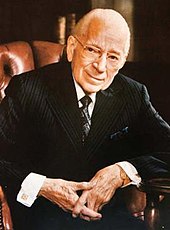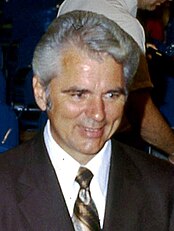Armstrongism refers to the teachings and doctrines of Herbert W. Armstrong while leader of the Worldwide Church of God (WCG).[1][2] His teachings are professed by him and his followers to be the restored true Gospel of the Bible. Armstrong said they were revealed to him by God during his study of the Bible.[3][4] The term Armstrongite is sometimes used to refer to those that follow Armstrong's teachings. Armstrongism and Armstrongite are generally considered derogatory by those to whom it is applied,[5] who prefer to be known as members of the Church of God (COG). These doctrines were also espoused by his sons Richard David Armstrong (until his death in 1958) and Garner Ted Armstrong (until his death in 2003) with slight variations.
Herbert Armstrong's teachings have similarities to those of the Millerites and Church of God (Seventh Day) (sometimes referred to as "COG7" to differentiate it from similarly styled sects named "Church of God" which worship on Sunday and generally hold to traditional Christian teachings), from which WCG is spiritually and organizationally descended. The religion is a blend of Christian fundamentalism, non-belief in the Trinity and some tenets of Judaism and Seventh-Day Sabbath doctrine.[6] Armstrong himself had been a COG7 minister before the Oregon conference stripped him of his ministerial credentials and excommunicated him for his seeking to water down and change their long-established COG7 doctrines. It was in the fall of 1937 when Elder Armstrong's credentials were revoked by the Salem Church of God organization. The reason given by the Board of Twelve Oregon Conference of the Church of God, 7th Day (COG7) for this adverse action against Herbert W. Armstrong, was because he taught and kept the annual Feast days. But the real reason seems to have been because of his uncooperative attitude.[7] Armstrong then began his own ministry.
Armstrong taught that most of the basic doctrines and teachings of mainstream Christianity were based on traditions, including absorbed pagan concepts and rituals (i.e. religious syncretism), rather than the Judeo-Christian Bible. His teachings have consequently been the source of much controversy. Shortly after Armstrong's death in 1986, the Worldwide Church of God started revising its core beliefs towards the concepts, doctrines, and creeds of mainstream Christianity. This resulted in many ministers and members leaving the WCG to start or join other churches, many of which continue to believe and teach Armstrong's doctrines to one degree or another. In 2009, the WCG changed its name to Grace Communion International (GCI). Today, the official doctrinal position of GCI is mainstream evangelical, although there are still GCI ministers and members who do not fully embrace all of the changes.
- ^ "Armstrongism, The Worldwide Church of God, The Church of God International" (PDF). Archived from the original on 2016-01-26. Retrieved 2017-04-30.
{{cite web}}: CS1 maint: bot: original URL status unknown (link) - ^ "Armstrongism". Archived from the original on 2007-08-30. Retrieved 2010-08-30.
- ^ Tkach, Joseph. "Transformed by Truth". pp. Chapter 7: What we Believed. Archived from the original on 30 January 2009. Retrieved 2009-02-16.
- ^ Mystery of the Ages, pp. 7–30
- ^ "What is "Armstrongism"?". Archived from the original on 2011-07-23. Retrieved 2010-08-30.
- ^ "HERBERT ARMSTRONG, 93, DIES; EVANGELIST AND A BROADCASTER". The New York Times. 1986-01-17. ISSN 0362-4331. Retrieved 2023-02-14.
- ^ "John Kiesz Furnishes Information on Herbert W. Armstrong". exitsupportnetwork.com. 2019-10-19. Retrieved 2023-02-14.


